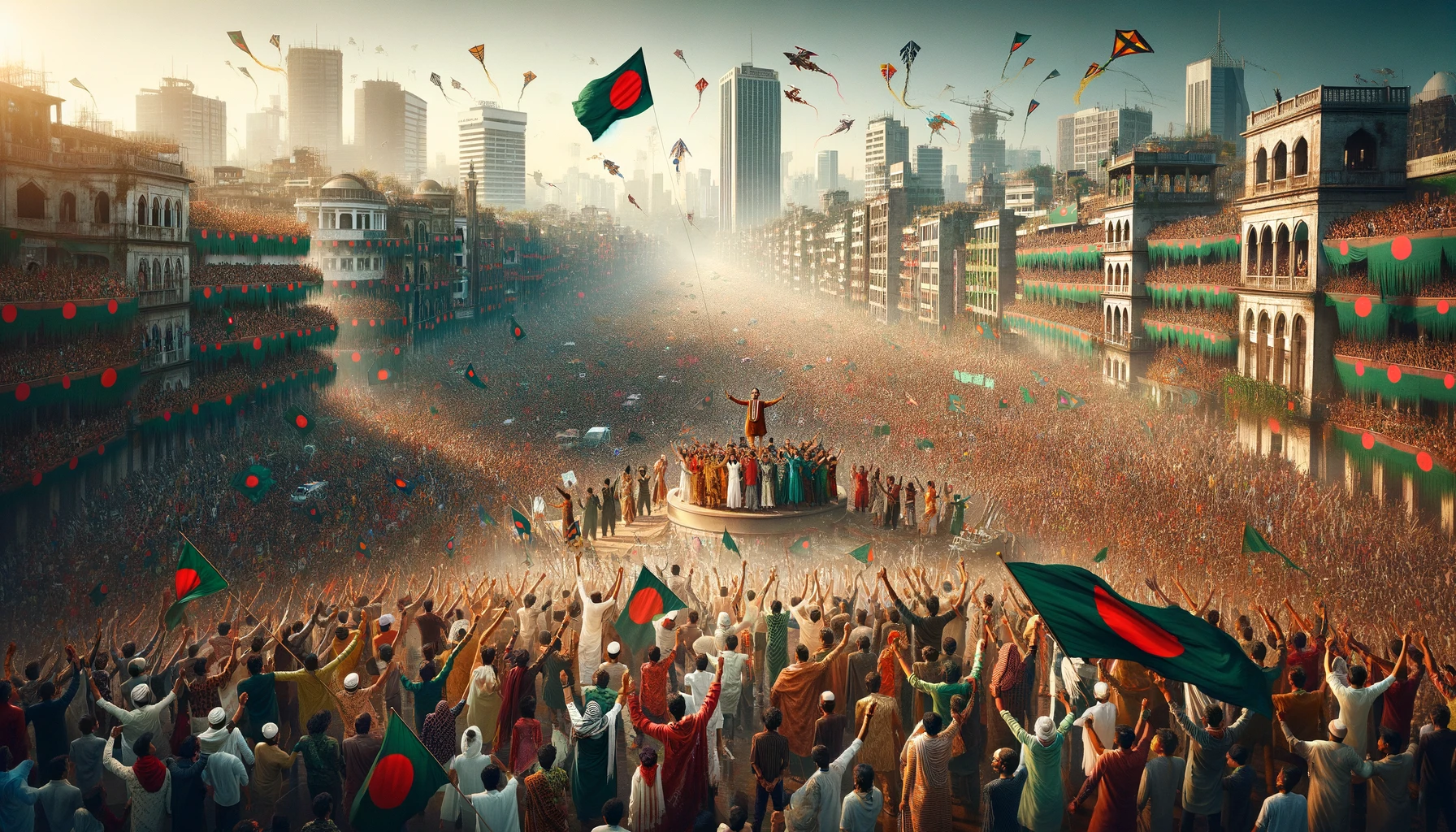On the 26th of March each year, Bangladesh marks a pivotal moment in its history – Independence Day. This day commemorates the country’s declaration of independence from Pakistan in 1971, a bold step that ignited the Bangladesh Liberation War.
Importance of the Day
Independence Day in Bangladesh is not just a historical milestone; it’s a celebration of national identity, culture, and the achievements of a nation that has overcome numerous challenges since its birth. It serves as a poignant reminder of the struggle for freedom and the price paid for the liberties enjoyed today. Across the nation, from the bustling streets of Dhaka to the serene landscapes of the countryside, the air fills with a sense of pride and unity. Red and green, the colours of the Bangladeshi flag, become even more prominent, symbolising the bloodshed for independence and the lush beauty of the land.
This day is a testament to the courage and determination of those who fought for their rights and envisioned a future of prosperity and peace for their homeland. It’s a day to celebrate progress, remember the sacrifices of the martyrs, and recommit to the ideals of liberty and justice for all.
Historical Context
The path to Bangladesh’s independence was paved with years of struggle, resilience, and a fervent desire for self-determination. The seeds of discontent were sown with the partition of British India in 1947, which led to the creation of East and West Pakistan. Geographically separated by thousands of kilometres and culturally distinct, the two regions were uneasily yoked together under a single state, governed predominantly from West Pakistan. This disparity set the stage for a series of conflicts that would eventually lead to the fight for independence.
Road to Independence
The Language Movement of 1952 was one of the first significant indicators of East Pakistan’s growing dissatisfaction. The people of East Pakistan (now Bangladesh) protested against the imposition of Urdu as the sole official language, advocating for Bengali, their mother tongue. This movement laid the foundation for the Bengali nationalist movement, emphasizing the region’s distinct identity and rights.
Tensions escalated over the years, culminating in the 1970 general elections. The Awami League, led by Sheikh Mujibur Rahman, secured a landslide victory based on its six-point demand for autonomy. However, the refusal of the ruling authorities in West Pakistan to transfer power led to widespread civil disobedience and calls for independence.
War of Independence
On the night of 25th March 1971, the Pakistani military launched Operation Searchlight, a brutal crackdown on the city of Dhaka, aiming to quell the burgeoning movement for independence. This act of aggression marked the beginning of the Bangladesh Liberation War.
Sheikh Mujibur Rahman was arrested, but not before he declared Bangladesh’s independence in the early hours of 26th March. This declaration spurred the people of Bangladesh to take up arms in a fight for their freedom. The war was characterized by guerrilla warfare waged by the Mukti Bahini (the Liberation Army), composed of Bengali military personnel and civilians.
The conflict lasted for nine months, witnessing widespread atrocities, the displacement of millions, and the loss of countless lives. International attention was drawn to the humanitarian crisis, leading to support for Bangladesh’s struggle for independence.
The war came to a decisive end on 16th December 1971, when the Pakistani military surrendered to the joint forces of the Mukti Bahini and the Indian Army, leading to the emergence of Bangladesh as a sovereign nation.
This historical backdrop is crucial for understanding the significance of Independence Day. It was not merely a political shift but a profound transformation borne out of the relentless struggle of the people of Bangladesh for their language, culture, and the right to govern their own land. The legacy of the Liberation War continues to inspire and shape the national identity of Bangladesh, making Independence Day a solemn occasion to remember the past and celebrate the spirit of freedom.
Commemoration and Celebrations
Independence Day in Bangladesh is a solemn yet vibrant commemoration, deeply rooted in the nation’s heart. It’s a day that awakens a collective memory of struggle and sacrifice, yet also celebrates the spirit of freedom and the joy of sovereignty. Across the nation, from the smallest villages to the largest cities, Bangladeshis come together to honour their history and look forward to their future.
National Observances
The day begins with the President and Prime Minister of Bangladesh paying respects at the National Martyrs’ Memorial in Savar, near Dhaka. This act of homage sets the tone for the nationwide observances that follow. Throughout the country, the national flag is hoisted atop public and private buildings, fluttering high as a symbol of independence and pride. A moment of silence is observed at dawn to remember the martyrs who laid down their lives for the nation’s freedom.
In the capital, a grand parade is often held, featuring members of the armed forces, police, and various social organisations. This parade is not just a display of military might but a representation of the unity and strength of the people of Bangladesh. Government buildings are illuminated, and roads are decorated with flags and lights, creating a festive atmosphere.
Symbols and Traditions
The colours of the national flag, red and green, dominate the day’s palette, symbolising the blood of those who fought for the country’s independence and the lush landscapes of Bangladesh. Citizens don red and green attire, and the streets are adorned with banners and decorations in these colours, creating a visually striking environment.
Cultural programs and exhibitions play a significant role in the day’s observances. Schools, colleges, and cultural organisations organise performances of music, dance, and drama that narrate the story of the Liberation War and the journey of the nation since independence. These events not only entertain but also educate, particularly the younger generations, about the sacrifices made for their freedom.
Public speeches and discussions are common, with leaders and citizens reflecting on the significance of Independence Day. These talks often focus on the achievements of the nation since 1971, the challenges it faces, and the path forward. Additionally, special prayers are offered in mosques and temples across the country, seeking peace and prosperity for the nation.
Television and radio channels broadcast special programs, documentaries, and films related to the Liberation War, ensuring that the stories of heroism and struggle reach every corner of the country. Social media becomes a platform for sharing messages of patriotism, with hashtags and campaigns promoting the spirit of Independence Day.
Celebrating Progress
Independence Day is also an occasion to celebrate the progress Bangladesh has made since 1971. The day reminds the citizens of their responsibility towards nation-building and encourages them to contribute to the country’s ongoing development. It’s a time for looking back with pride and moving forward with determination, as Bangladesh continues to carve its place on the global stage.
Reflections on Freedom and Progress
Bangladesh Independence Day serves as a profound moment of reflection for the nation, an occasion to ponder over the journey from a struggle for identity and sovereignty to achieving a place on the world stage. It’s a time to acknowledge the sacrifices made for freedom, celebrate the progress attained, and envision a future that upholds the values for which countless lives were laid down.
Reflections on Freedom
Independence Day is a reminder of the cost of freedom. It’s a day to honour the memory of the martyrs who fought valiantly and those who lost their lives in the quest for independence. The celebrations and solemn commemorations across the country serve as a reflection on the values of liberty, justice, and the right to self-determination. This day encourages Bangladeshis to not take their freedom for granted but to cherish and protect it as a precious gift from their forebearers.
The narrative of freedom that pervades the day’s events fosters a sense of unity and national pride. It’s an opportunity for individuals to reflect on their roles as citizens of a free nation and consider how they can contribute to the ongoing journey of nation-building. Independence Day underscores the importance of maintaining the democratic values and human rights that are the foundations of the nation’s identity.
Progress Since Independence
Since 1971, Bangladesh has navigated a complex path of development, facing numerous challenges but also achieving significant milestones. Independence Day is an apt occasion to highlight these achievements, reflecting on how far the nation has come. From advancements in sectors like education, healthcare, and technology to significant strides in economic growth, including the textile and garment industry, Bangladesh has demonstrated resilience and ambition.
The progress made in reducing poverty, improving literacy rates, and enhancing gender equality is also noteworthy. These successes are a testament to the nation’s collective will to overcome obstacles and pursue development. However, reflecting on progress also means acknowledging the ongoing challenges that lie ahead, such as climate change, urbanization, and ensuring sustainable development.
This day inspires a forward-looking approach, where the spirit of independence fuels ambitions for a better future. It’s a call to action for every citizen to participate in the nation’s journey towards greater prosperity, equity, and global integration.
Envisioning the Future
Independence Day is not only about looking back but also about envisioning the future. It’s an opportunity to dream of a Bangladesh that upholds the principles of its Liberation War—sovereignty, democracy, and social justice. As the country continues to evolve, this day serves as a reminder of the potential that lies within the nation and its people to achieve greater heights.
Reflecting on freedom and progress during Independence Day fosters a sense of responsibility among Bangladeshis to contribute to their country’s development. It encourages an inclusive vision for the future, where every citizen, irrespective of their background, has the opportunity to thrive. The day is a reaffirmation of the commitment to building a Bangladesh that is prosperous, resilient, and a beacon of hope for developing nations around the world.
Through these reflections, Bangladesh Independence Day becomes more than just a historical commemoration; it transforms into a catalyst for unity, progress, and a brighter future. It’s a day that celebrates the journey thus far while also inspiring collective action towards achieving the dreams and aspirations of a nation reborn from the ashes of war.




